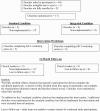Cluster-randomized trial comparing organizationally tailored versus standard approach for integrating an evidence-based cancer control intervention into African American churches
- PMID: 34255087
- PMCID: PMC9274980
- DOI: 10.1093/tbm/ibab088
Cluster-randomized trial comparing organizationally tailored versus standard approach for integrating an evidence-based cancer control intervention into African American churches
Abstract
The field of implementation science has devoted increasing attention to optimizing the fit of evidence-based interventions to the organizational settings in which they are delivered. Institutionalization of health promotion into routine organizational operations is one way to achieve this. However, less is known about how to maximize fit and achieve institutionalization, particularly in settings outside of the healthcare system. This paper reports on findings from a parallel cluster-randomized trial that compared an organizationally tailored with a standard (core components only) approach for institutionalizing ("integrating") an evidence-based cancer control intervention into African American churches. Churches randomized to the organizationally tailored condition identified three or more implementation strategies from a menu of 20, with an implementation time frame for each. The primary study outcome was assessed through the Faith-Based Organization Health Integration Inventory, a measure of institutionalization of health promotion activities in church settings, completed by pastors at baseline and 12-month follow-up. Seventeen churches were randomized and 14 were analyzed as 3 did not implement the study protocol. Though the percent increase in total integration score was greater in the tailored condition (N = 9; 18%) than in the standard condition (N = 5; 12%), linear mixed-effect models did not detect a statistically significant group × time interaction. Despite the challenges of integrating health promotion activities outside of healthcare organizations, the current approach shows promise for fostering sustainable health promotion in community settings and merits further study.
Trial registration: ClinicalTrials.gov NCT03178383.
Keywords: Adaptation; Cancer; Implementation; Institutionalization; Organizational context; Sustainability.
Plain language summary
Researchers have become interested in studying how health promotion activities fit within the organizational setting where they are delivered. Health activities that are integrated into the host setting’s structures and routine operations are more likely to be fully executed, effective, and sustained. Unfortunately, we know little about how to achieve such integration. This is especially true when working outside of a healthcare system, in community organizations like churches. We report findings from a study that compared an approach to tailoring health promotion activities into their host settings, with a standard, non-tailored approach. The study was conducted in 14 African American churches randomly assigned to the tailored or standard group. The health promotion activity involved training lay people to conduct cancer educational workshops for church members. We measured the extent to which the churches integrated health promotion activities into their structures, processes, resources, and communication at the beginning and one year later. We found that while the churches had overall increases in these factors over time, those in the tailored group did not do so to a greater degree than those in the standard group. Even so, this approach to tailoring health promotion activities to the organizational setting merits future study.
© Society of Behavioral Medicine 2021. All rights reserved. For permissions, please e-mail: journals.permissions@oup.com.
Figures

Similar articles
-
Development and validation of an instrument to assess institutionalization of health promotion in faith-based organizations.Eval Program Plann. 2020 Apr;79:101781. doi: 10.1016/j.evalprogplan.2020.101781. Epub 2020 Jan 21. Eval Program Plann. 2020. PMID: 31991309
-
Adoption, reach, and implementation of a cancer education intervention in African American churches.Implement Sci. 2017 Mar 14;12(1):36. doi: 10.1186/s13012-017-0566-z. Implement Sci. 2017. PMID: 28292299 Free PMC article. Clinical Trial.
-
Development of tailored feedback reports on organizational capacity for health promotion in African American churches.Eval Program Plann. 2018 Oct;70:99-106. doi: 10.1016/j.evalprogplan.2018.07.002. Epub 2018 Jul 21. Eval Program Plann. 2018. PMID: 30041105 Free PMC article. Clinical Trial.
-
A Multilevel Diabetes and CVD Risk Reduction Intervention in African American Churches: Project Faith Influencing Transformation (FIT) Feasibility and Outcomes.J Racial Ethn Health Disparities. 2020 Dec;7(6):1160-1171. doi: 10.1007/s40615-020-00740-8. Epub 2020 Apr 23. J Racial Ethn Health Disparities. 2020. PMID: 32329033 Free PMC article.
-
Facilitators and Barriers When Conducting Adult Health Programs Within the African American Church: A Systematic Review.J Relig Health. 2023 Aug;62(4):2496-2531. doi: 10.1007/s10943-022-01532-6. Epub 2022 Mar 18. J Relig Health. 2023. PMID: 35303242
Cited by
-
Implementation outcomes and associated constructs from the Consolidated Framework for Implementation Research among churches trained online to implement Faith, Activity, and Nutrition in a national implementation study.Transl Behav Med. 2025 Jan 16;15(1):ibaf015. doi: 10.1093/tbm/ibaf015. Transl Behav Med. 2025. PMID: 40440472 Free PMC article.
-
The role of organizational capacity in intervention efficacy in a church-based cancer education program: A configurational analysis.Glob Implement Res Appl. 2023 Sep;3(3):284-294. doi: 10.1007/s43477-023-00089-0. Epub 2023 Jun 11. Glob Implement Res Appl. 2023. PMID: 38107832 Free PMC article.
-
Faith-based Messaging and Materials for Colorectal Cancer Screening in the United States: Application of Boot Camp Translation within the African Methodist Episcopal Church.J Relig Health. 2025 Jun;64(3):2195-2212. doi: 10.1007/s10943-024-02180-8. Epub 2024 Nov 25. J Relig Health. 2025. PMID: 39586966 Free PMC article.
References
Publication types
MeSH terms
Associated data
Grants and funding
LinkOut - more resources
Full Text Sources
Medical

